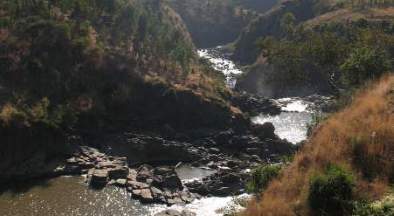The project was initiated as low level of IWRM awareness was seen as the cause of many struggles in the area. The project resulted in the adoption of an IWRM Plan and its participatory approach made communities better aware of water resources management issues and of how their practices affect others.
Farmers in the upper Berki River Basin use pumps to collect water from the river. A plan to introduce one hundred more pumps was suggested which, if implemented, could negatively impact irrigation activities downstream. The Church, who uses the water for spiritual purposes, anticipated that the government would start using the spring to supply water to Agula town, and a conflict with the Bureau of Water Resources was a fact. Moreover, a conflict between the downstream traditional irrigation water users and the upstream water users resulted in the destruction of the diversion dam by the downstream users. As the root cause of the complex challenge was ascribed the low level of IWRM awareness and the lack of an institutional framework for stakeholders’ participation, the Ethiopian Country Water Partnership and GWP Eastern Africa decided to take action.
A longer summary and the full case study is available at the GWP ToolBox.
